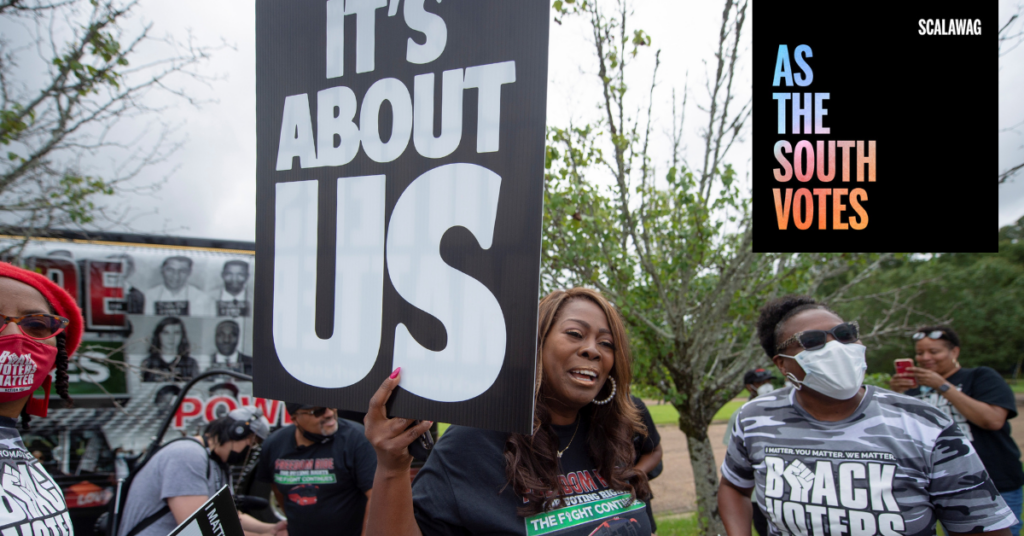Black History Month reflections: How can our Southern grassroots movements create lasting structural change?
Originally published in Scalawag.
In the U.S. South, race is one of the most significant hurdles to our social political progress. Racialized geographies haunt our daily interactions. They are infused into our collective memory banks, dictating much of the ways we show up in our world. On the surface, our lived realities in this white supremacist, patriarchal system can seem new, but a meager investigation into the past debunks that myth swiftly.
120 years ago W.E.B. Dubois wrote, “the problem of the twentieth century is the problem of the color line,” in The Souls of Black Folks. His words touch on the blatant, unapologetic truth that Black folks in this country are in a constant state of struggle for the basic acknowledgment of our humanity.
From 1882 to 1968, almost 5,000 human beings were lynched in the United States. That number does not include victims of the carceral state–wrongfully accused Black men who died in jails, were murdered by the police, or did not survive white supremacist mob violence. In fact, as many as 600 Black folks were murdered in the Wilmington Coup d’Etat and Tulsa race riot alone.
In the first 100 years of the 20th century, the eruption of Black social movements demanded an acknowledgement of our humanity. The NAACP was formed in direct response to the lynching genocides of Black folks in the South. Let that sink in: It was a socio-political organization, not the U.S. government, that took up the mantle to end the lynching crisis.
The white supremacist violence Black folks face in the U.S. South and beyond has everything to do with social, political and economic resilience. Every time there is progress towards establishing, fortifying and existing in our humanity, white supremacist violence is the backlash. The Civil War and subsequent passing of the Reconstruction Amendments inspired the formation of the KKK, known as the “invisible empire in the South”. Their members would go on to garner support from elected officials throughout the region, as evidenced in 1949 when Strom Thurman committed the resources of the South Carolina state police to protect the KKK. This historical reality must ground us as we chart our next steps; an understanding of its truths is required to envision the future of our movements.
We are at a critical moment in Southern movement. The resurgence of the invisible empire is here, marked nationally by January 6th, and locally by white supremacist violence in Charlottesville, VA and more recently in Moore County, NC. All of us must acknowledge the global solidarity that white supremacy has as we simultaneously acknowledge and find courage in the South as a global beacon for hope and justice. The South has a strong history of progressive movement centers including Birmingham, AL; Jackson, MS; Charleston, SC; and Durham, NC, just to name a few. We have everything we need to organize for the world we want. In order to build that world, we’ll have to aggressively counter the criminal realities of the past.
Conversations about building political and electoral power are too often relegated to election season even though voting has long been recognized as an important tool for our ability to make change. So let me take this opportunity during Black History Month to call us all to urgent action: Our Southern, grassroots political candidates and power-building organizations need to be fully supported by a multi-racial coalition, especially one that sees white progressives and other folks of wealth and means around the world moving resources year-round in support of their work. This is one way we can correct the harms of slavery and Jim Crow and create lasting structural change.

It’s time we put our money where our mouths are, votes where our hearts are, and train and elect leaders who want to see the economic and social constructs that have historically kept Black, Latinx, Indigenous, and other marginalized folks from enjoying the bounty of abundance and full right to live safely in this “great” country come crashing down. Yes, voting is just one complicated tool in our bag, but it is the first step to building a lasting foundation for transformational change in the South, the country, and perhaps even the world.
Joshua Vincent
Executive Director, Southern Vision Alliance
Joshua Vincent is a musician, scholar, and organizer from Raleigh, NC. He currently serves as the executive director of the Southern Vision Alliance, a movement focused grassroots intermediary that specializes in fiscal sponsorship, incubation and coaching for grassroots formations, and regranting through their FrontLines Fund. You can learn follow Joshua on Instagram at Liberated_Mind, on Twitter @therealjvincent, and learn more about the Southern Vision Alliance at www.southernvision.org.
